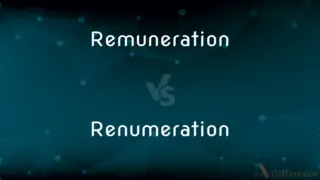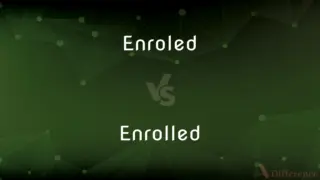Cognative vs. Cognitive — Which is Correct Spelling?
By Tayyaba Rehman — Updated on March 25, 2024
"Cognative" is an incorrect spelling. The correct spelling is "Cognitive," which refers to mental processes like thinking, understanding, and learning.

Table of Contents
Which is correct: Cognative or Cognitive
How to spell Cognitive?

Cognative
Incorrect Spelling

Cognitive
Correct Spelling
ADVERTISEMENT
Key Differences
Think of the phrase "cog in the wheel" for "Cog-" and add "–itive" to form Cognitive.
There's "give" in "Cognitive," so give it some thought!
Remember that "–ative" is usually wrong; it’s “–itive” in "Cognitive."
"Cognitive" ends with "–ive," which is common for adjectives (e.g., active, passive).
"Cognitive" shares its "Cog-" prefix with "cognition," both referring to mental processes.
ADVERTISEMENT
How Do You Spell Cognitive Correctly?
Incorrect: The study explores different cognative functions.
Correct: The study explores different cognitive functions.
Incorrect: Cognative dissonance makes it hard to decide.
Correct: Cognitive dissonance makes it hard to decide.
Incorrect: She took a test to measure her cognative ability.
Correct: She took a test to measure her cognitive ability.
Incorrect: The therapy focuses on enhancing cognative processes.
Correct: The therapy focuses on enhancing cognitive processes.
Incorrect: His cognative skills improved after the training.
Correct: His cognitive skills improved after the training.
Cognitive Definitions
Concerned with the acquisition of knowledge through thought and experience.
Cognitive psychology studies how people learn.
Relating to mental processes like thinking or problem-solving.
Cognitive skills are crucial for problem-solving.
Referring to the mental representations of the world.
Cognitive maps help us navigate our environment.
Pertaining to intellectual activities such as reasoning or remembering.
Cognitive decline can be a symptom of certain diseases.
Relating to the mental action or process of acquiring knowledge and understanding.
Cognitive development is vital in childhood.
Of, characterized by, involving, or relating to cognition
"For the person experiencing cognitive decline, the slow loss of coherent speech will be compounded by a declining ability to draw conclusions" (Joanne Koenig Coste).
Relating to the part of mental functions that deals with logic, as opposed to affective which deals with emotions.
Intellectual.
Cognate; which is to be recognized as cognate.
Cognate.
Knowing, or apprehending by the understanding; as, cognitive power.
Of or being or relating to or involving cognition;
Cognitive psychology
Cognitive style
Cognitive Meaning in a Sentence
Playing puzzles and games can enhance cognitive skills.
The teacher uses strategies to boost students' cognitive growth.
Understanding cognitive biases can improve decision-making.
Research shows that meditation can improve cognitive performance.
Her cognitive abilities were above average for her age.
Cognitive therapy helps people change negative thought patterns.
The cognitive test assessed his memory and attention.
The study linked nutrition to cognitive development in children.
Her cognitive decline was gradual and subtle.
Aging can affect cognitive capacities, such as memory.
Stress can have a negative impact on cognitive abilities.
Children's cognitive development is influenced by their environment.
Attention is a key component of cognitive functioning.
He attended a workshop to improve his cognitive function.
Cognitive science studies how people think, learn, and remember.
Cognitive enhancement drugs are controversial and widely debated.
Artificial intelligence attempts to mimic human cognitive processes.
Cognitive load theory explains why we can only learn so much at once.
The cognitive assessment took about an hour to complete.
Her cognitive recovery after the accident was remarkable.
Physical exercise has a positive effect on cognitive health.
Sleep plays a crucial role in cognitive restoration.
The cognitive revolution changed the field of psychology significantly.
Reading regularly can have a long-term positive effect on cognitive abilities.
Learning a new language can boost cognitive flexibility.
Cognitive Idioms & Phrases
Cognitive dissonance
The discomfort experienced when holding conflicting ideas, beliefs, or values.
She felt cognitive dissonance after buying a car she knew was too expensive for her budget.
Cognitive decline
A decrease in cognitive function, often associated with aging.
The family noticed his cognitive decline when he started forgetting important dates.
Cognitive load
The total amount of mental effort being used in the working memory.
Simplifying lessons can reduce cognitive load and help students learn better.
Cognitive flexibility
The ability to adjust one's thinking from old situations to new situations.
Cognitive flexibility helps her adapt to changes at work smoothly.
Cognitive enhancement
Activities or substances that improve cognitive function.
Some students use caffeine for cognitive enhancement during exams.
Cognitive restructuring
A therapeutic process that helps individuals to identify and change negative thoughts.
Cognitive restructuring is a key component of cognitive-behavioral therapy.
Common Curiosities
What is the verb form of Cognitive?
Cognize.
What is the root word of Cognitive?
From Latin "cognitio," meaning "knowledge."
What is the singular form of Cognitive?
Cognitive.
Which conjunction is used with Cognitive?
Conjunction use is context-dependent.
Which vowel is used before Cognitive?
Depends on context. Typically, "a" as in "a cognitive test."
What is the pronunciation of Cognitive?
/ˈkäɡ.nə.tɪv/.
Is Cognitive an abstract noun?
No, it is an adjective.
What is the plural form of Cognitive?
Cognitive doesn’t have a plural form; it's an adjective.
Which preposition is used with Cognitive?
Typically "of," as in "cognitive of the situation."
Why is it called Cognitive?
Derived from Latin "cognitio," meaning "knowledge." It refers to mental activities associated with acquiring knowledge.
Is Cognitive an adverb?
No.
Is the Cognitive term a metaphor?
No, it is a descriptive term.
Is the word Cognitive imperative?
No.
How many syllables are in Cognitive?
Three syllables.
How do we divide Cognitive into syllables?
Cog-ni-tive.
What is the third form of Cognitive?
Cognitive does not have a third form; it is an adjective.
Which article is used with Cognitive?
"A" or "the," depending on the context.
Is Cognitive a noun or adjective?
Adjective.
Is Cognitive a negative or positive word?
Neutral, though connotation can depend on context.
What part of speech is Cognitive?
Adjective.
What is another term for Cognitive?
Mental or intellectual.
What is the first form of Cognitive?
Cognitive.
Is Cognitive a collective noun?
No.
Is Cognitive a countable noun?
It is not a noun.
What is a stressed syllable in Cognitive?
The first syllable, "Cog."
Which determiner is used with Cognitive?
Depends on context; "this," "that," "a," and "the" can be used.
What is the second form of Cognitive?
Cognitive does not have a second form; it is an adjective.
Is Cognitive a vowel or consonant?
It's a word that contains both vowels and consonants.
What is the opposite of Cognitive?
Non-cognitive or emotional (in certain contexts).
How is Cognitive used in a sentence?
Cognitive abilities are essential for academic success.
Share Your Discovery

Previous Comparison
Agast vs. Aghast
Next Comparison
Tipical vs. TypicalAuthor Spotlight
Written by
Tayyaba RehmanTayyaba Rehman is a distinguished writer, currently serving as a primary contributor to askdifference.com. As a researcher in semantics and etymology, Tayyaba's passion for the complexity of languages and their distinctions has found a perfect home on the platform. Tayyaba delves into the intricacies of language, distinguishing between commonly confused words and phrases, thereby providing clarity for readers worldwide.









































